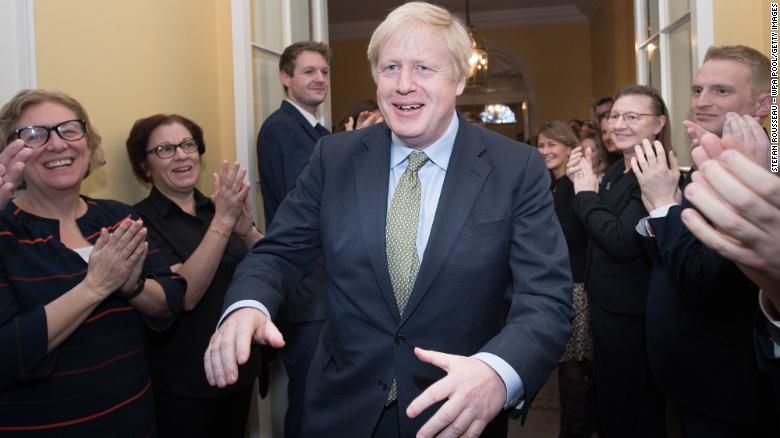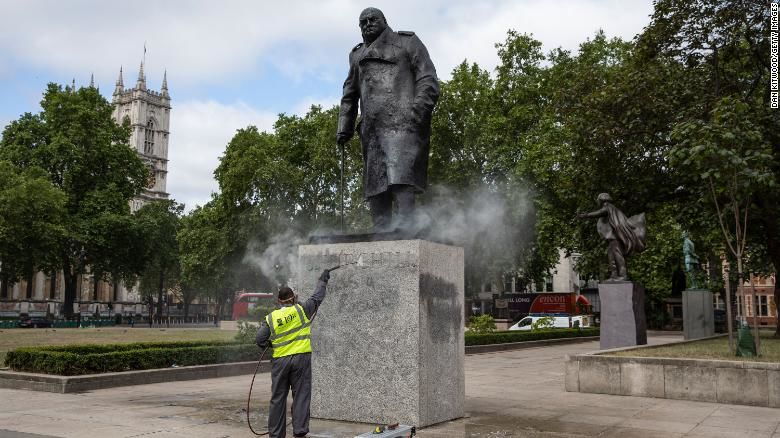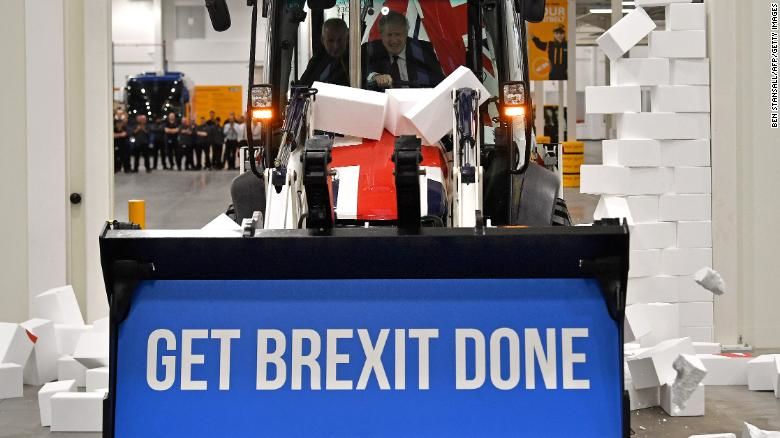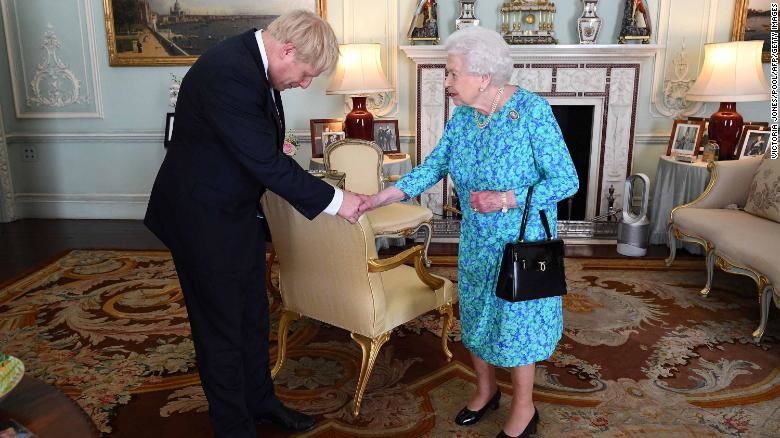
Analysis: Boris Johnson is using culture wars to cement his grip on power. That's a big risk in angry and divided Britain
However, the drift of voters in England to Johnson -- including those from areas that had been held for decades by the center-left opposition Labour party -- was also the result of a deliberate Conservative effort to become so dominant in England that his unpopularity in the UK's smaller constituent nations like Scotland and Wales matters less.
After his undeniably impressive election win in 2019, a big question was how Johnson would spend the enormous political capital that he'd amassed.
The answer, at least in part, appears to be on locking down that English vote. Johnson's three major political triumphs -- Brexit, the 2019 general election and last week's municipal votes -- were without question built on the support of socially conservative English voters attracted to his blend of populism, nativism and statism.
This group of voters has broken the traditional left-right paradigm. They are patriotic traditionalists who dislike the idea of foreign entities, particularly the European Union and its associated institutions, holding sway over British laws. They hate talking down British history or tradition. However, they are less conservative when it comes to the state's role in society. They support the police, want to retain free National Health Service and don't mind the wealthy paying high taxes if it means greater state spending.
When placed in that context, many of Johnson's policy choices since taking office make sense.

Where he once talked of a post-Brexit "Global Britain," much of his government's foreign policy has focused on matters that play into domestic political concerns, like introducing tougher immigration laws and reducing foreign aid.
Domestic policy has been similarly unsubtle. While Johnson has been able to resist his small-state, libertarian instincts in order to get through the pandemic -- imposing harsh lockdowns and signing off on huge state spending to save jobs and buy vaccines -- his social and cultural conservatism has been on regular display.
The latest controversy has been over a proposal that voters in the UK would require photo ID cards in order to participate in elections. Despite there being no particular clamor for such a move -- the incidence of electoral fraud in the UK is remarkably low -- it has been Conservative policy to make such a change since the 2017 general election.
After a number of trials, Johnson's government pledged to implement voter ID in the next parliamentary session and it was included in this week's Queen's Speech. A parliamentary report published last year shows clearly that such a move would disproportionally affect people from minority backgrounds and lower socio-economic groups -- both of whom are less likely to vote Conservative.
Even if voter ID never becomes a reality in the UK, critics argue that even having arguments like this, with the government firmly on one side and the liberal left on the other, serves to burnish Johnson's socially Conservative credentials. Further evidence that this was an engineered argument came when the Cabinet Office quietly published a press release confirming that the range of acceptable ID would be quite broad, though it still allowed the policy announcement to be vague enough to cause controversy.
Similar concerns were raised following the government's recent report into structural racism, which was published in the aftermath of Black Lives Matter protests that took place all over the UK last summer.
 A worker cleans the Churchill statue in Parliament Square that had been
spray painted with the words "was a racist" in June 2020 in London.
A worker cleans the Churchill statue in Parliament Square that had been
spray painted with the words "was a racist" in June 2020 in London.
It was widely criticized for concluding there was no evidence the UK was institutionally racist, and suggesting that the successes of some minority groups should be "regarded as a model for other white-majority countries." It also bizarrely said that while children should be taught about the horrors of Britain's slave trade, that should be accompanied with lessons of how "culturally African people transformed themselves into a re-modeled African/Britain."
Kehinde Andrews, professor of Black history at Birmingham City University, has observed this airing of arguments phenomenon first-hand. "I often get asked onto news programs to debate things like the government report on racism. It doesn't matter what I say, the right always wins these debates because they are able to make me look like someone who doesn't love Britain."
Rob Ford, professor of politics at the University of Manchester, notes that the report contains much that is catnip to liberals searching for sticks with which to beat Johnson.
"Having these cultural arguments will always favor Johnson because his base is more solid than his opponent's," Ford says. "Britain might be a divided country, but if even a small slice of people who loathe Johnson can be painted as anti-patriots, it gives them one more enemy to unite against."
On the one hand, it could be argued that the measures Johnson is taking are not as consequential as his opponents might have you believe.
Arguments tend to play out according to a familiar pattern: Allies of the Prime Minister brief controversial measures such as appointing controversial Conservative figures to the boards of the BBC and media regulators. A huge argument then plays out with liberals accusing the government of Trumpist behavior. Having reveled in the culture war playing out across a few news cycles, the government then appoints more moderate figures to the boards.

"The message, it seems to me, was that these elitist institutions were being put on notice for their perceived anti-conservative bias and should be prepared for a 'war on woke,'" says Tim Bale, professor of politics at the Queen Mary University of London. "It might have no impact; it might discourage news editors from leading on certain stories; it might give the public pause for thought as to the impartiality of the news organization later down the line. All of which would still be government victories."
Earlier this month, a high-profile entrepreneur resigned as chair of the Royal Museums of Greenwich, the body that oversees the Royal Observatory in London, claiming that Johnson's government declined to reappoint a trustee whose academic work proposes "decolonising" the public education system.
A government spokesman told the Financial Times that "there is no automatic presumption of reappointment, and indeed in the vast majority of cases, fresh talent is added with new appointments made."
Ford points out that, of course, this is "a far cry from sending academics off to re-education camps," but that, again, it could cause institutions to think twice about what sort of research they might fund in the future.
How effective are these nudges and winks at shifting the country's cultural boundaries?
Bonnie Greer, an American-British writer who has served on boards for some of the most important British cultural institutions, explained to CNN that governments "try to shape culture to fit their political aims ... because culture is what people make; how we relate to each other; the stories we tell; the people we are."
Cultural institutions, academic organizations and, media regulators are one thing. But critics say that if that logic bleeds into the fabric of the independent institutions of governance, it is only a short road, for example, to undermining the independence of Britain's judiciary.

Johnson's government has already held inquiries into the manner in which the courts can hold the government to account. While those reports haven't really come up with much, they are taking place in a political context where Johnson's government had a public spat with the Supreme Court over the government suspending parliament when it was attempting to force through its Brexit deal in the face of tough political opposition.
"Even if you have a very high standard of independence in the courts, if judges' names are being printed in angry articles about the courts undermining the government, everyone is human," says Andrew Blick, Reader in politics and contemporary history at King's College London. While he notes that he hasn't seen this happen yet, he can see a situation where judges decide not to provoke Johnson and his ministers and give them the pretext for a culture war with the courts.
"Unlike America, we don't have a codified constitution, so culture really does matter. We culturally accept that the courts are independent, we don't rely on a piece a paper," Blick adds. "If culture can be used for good, it can also be used for ill."
However dramatic this all sounds, Brits only need look to their former fellow EU members for examples of how the independence of judiciaries has been chipped away in countries like Hungary and Poland.
It could well be the case that Johnson's lasting legacy is not the man who delivered Brexit, but a leader who truly shifted the foundations of his nation's political culture during a time of unprecedented turbulence.
It could all fall apart after the pandemic ends and Brexit becomes a distant memory. We still have no idea how Johnson governs in normal times. But it could also stick and, through his coalition of English, socially conservative voters, keep him in power for years to come.
That might be ideal for someone who seeks only power. But if Johnson's love for his country is not merely performative, it's a serious gamble to play politics with something as fragile as a nation's culture. Especially when that nation is as angry and divided as the UK has been for the past five years.











